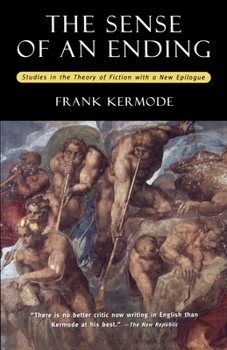The Sense of an Ending: Studies in the Theory of Fiction with a New Epilogue
Select Format
Select Condition 
Book Overview
Frank Kermode is one of our most distinguished critics of English literature. Here, he contributes a new epilogue to his collection of classic lectures on the relationship of fiction to age-old concepts of apocalyptic chaos and crisis. Prompted by the approach of the millennium, he revisits the book which brings his highly concentrated insights to bear on some of the most unyielding philosophical and aesthetic enigmas. Examining the works of writers from Plato to William Burrows, Kermode shows how they have persistently imposed their "fictions" upon the face of eternity and how these have reflected the apocalyptic spirit. Kermode then discusses literature at a time when new fictive explanations, as used by Spenser and Shakespeare, were being devised to fit a world of uncertain beginning and end. He goes on to deal perceptively with modern literature with "traditionalists" such as Yeats, Eliot, and Joyce, as well as contemporary "schismatics," the French "new novelists," and such seminal figures as Jean-Paul Sartre and Samuel Beckett. Whether weighing the difference between modern and earlier modes of apocalyptic thought, considering the degeneration of fiction into myth, or commenting on the vogue of the Absurd, Kermode is distinctly lucid, persuasive, witty, and prodigal of ideas.
Format:Paperback
Language:English
ISBN:0195136128
ISBN13:9780195136128
Release Date:April 2000
Publisher:Oxford University Press
Length:224 Pages
Weight:0.79 lbs.
Dimensions:0.6" x 5.5" x 8.5"
Customer Reviews
2 ratings
Profound Reflections on Literary (and Historical) Endings
Published by Thriftbooks.com User , 18 years ago
I've just finished re-reading Frank Kermode's THE SENSE OF AN ENDING, a series of lectures he gave at Bryn Mawr College in 1965. (The version I have does not have the new epilogue.) The basic theme of his lectures is how and the extent to which fiction is ordered and oriented to beginnings and, in particular, endings. In the course of these lectures, Kermode examines concepts such as chronos, kairos, aevum, and apocalypse, and extends his discussions beyond the realm of literature to make observations on history and the way we experience time. In this area, he is particularly influenced by the work of the French art historian, Henri Focillon. Kermode was also influenced by the times in which he presented these lectures: the threat of a nuclear apocalypse had been louring on the horizon for several years, and the end of the twentieth century was rapidly approaching. This slender volume is both challenging and illuminating. Kermode presupposes that the listener/reader is well versed in English and French literature, particularly that of the early twentieth century. His audience is definitely his erudite peers; he does not condescend to pull up others with less of a grasp of his subject. But even this poor student has found great inspiration in his words. His analysis of endings, in literature as well as life, has informed my own studies. Kermode's lectures are well worth reading and re-reading.
Foundational
Published by Thriftbooks.com User , 19 years ago
Apocalyptic literature is one area of novels that is permanent fixed with the ending of a time period, and by nature it has to be. When authors attempt through their literature to prophecy how the future will end up because of social beliefs or actions today or to predict the timing of future events based on oftentimes religious beliefs, they are wrong much of the time. Their reactions, as Kermode describes, are typical. They assume that their belief is still correct but that they were flawed in their analysis of the information, which propels them to reinterpret the facts and try again. It is self-perpetuating. Kermode's topic, that things of this life require a sense that a beginning and an ending exist, feels on first glance absolutely correct all the time. But his claim that we need definitive endpoints to feel a sense of purpose works for novels (the genre he discusses most frequently) does not necessarily show itself true in the short story genre. In short stories, the imitated reality is more like a snapshot of life than a part of life that starts and finishes. Many short stories, like Edgar Allen Poe's "The Cask of Amontillado," Andrea Barrett's "Servants of the Map," and T. Coraghessan Boyle's "The Love of My Life," do follow the tick-tock chronos phenomenon most present in novels, but many short story authors like Raymond Carver in "Kindling" and "Cathedral" leave the reader with a sense that although there may be a beginning and end to the conflict in the story there is not an end to that character's life, even though the book itself has to come to a close. The character's life continues on after the reader leaves the story, and oftentimes the conflict also remains unresolved. That said, Kermode's theoretical approach to endings in literature is foundational to the study of novels and writing in general. It is a work worth reading. Reviewed by Jonathan Stephens





